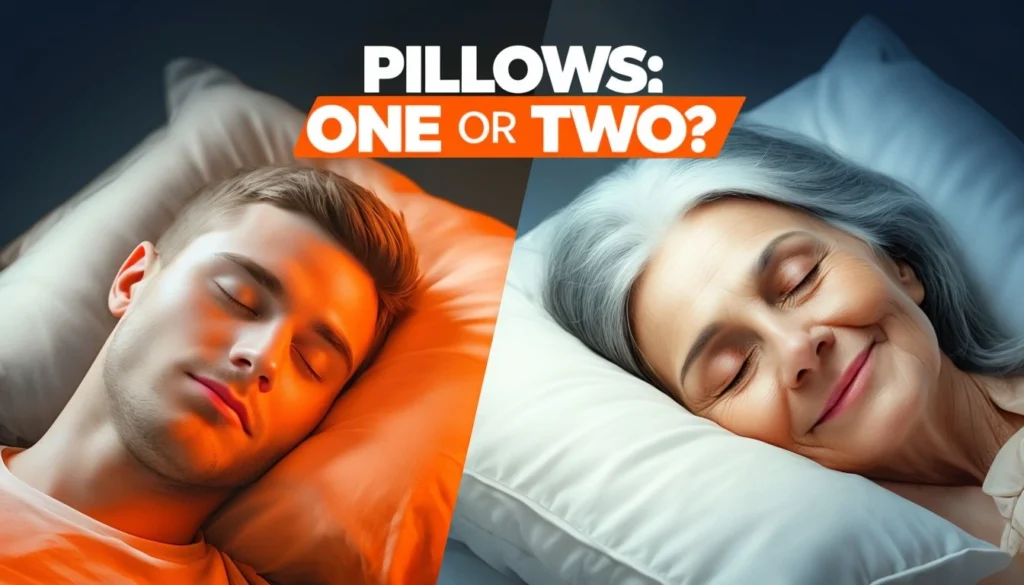
Introduction: Snoring—More Than Just Noise
Snoring is a common sleep disturbance that affects 44% of men and 28% of women in the U.S., according to the National Sleep Foundation. While often dismissed as a harmless annoyance, snoring can be a symptom of serious health issues like sleep apnea or nasal congestion. This article delves into whether Sleeping with Two Pillows can improve snoring and explores other effective remedies for better sleep.
How Sleeping Position Affects Snoring
Your sleeping position plays a significant role in snoring. Sleeping flat on your back allows the tongue and soft tissues in your throat to collapse backward, partially blocking the airway and causing vibrations. Elevating your head with pillows can help keep airways open, but is using two pillows the right choice?
Does Sleeping with Two Pillows Help?
Using two pillows can offer some benefits, but it’s not a universal fix.
Benefits of Sleeping with Two Pillows:
- Elevates the Head: Raising your head can minimize throat tissue collapse, reducing snoring.
- Improves Nasal Drainage: Elevation helps clear nasal passages, which is particularly beneficial for congestion-related snoring.
Potential Drawbacks:
- Neck Strain: Excessive elevation from two pillows may bend your neck at an unnatural angle, worsening airway blockage and causing discomfort.
Scientific Insights: Pillows and Snoring
Research published in the Journal of Clinical Sleep Medicine highlights that elevating the head during sleep reduces snoring severity in mild to moderate cases. Specialized pillows, such as wedge or adjustable memory foam pillows, proved more effective than stacking two standard pillows.
Key Takeaway:
While two pillows might help temporarily, they may not offer the consistent support required for long-term snoring relief.
Pillow Arrangements: Pros and Cons
| Pillow Setup | Benefits | Drawbacks |
|---|---|---|
| One Standard Pillow | Basic comfort | Limited elevation |
| Two Standard Pillows | Greater head elevation | Risk of neck strain |
| Wedge Pillow | Consistent elevation without strain | May not suit all sleepers |
| Memory Foam Pillow | Contours to neck, supports airways | Higher cost |
Explore wedge pillows like the highly rated Xtra-Comfort Bed Wedge Pillow on Amazon. These are designed specifically to reduce snoring while maintaining proper neck and back alignment.
Complementary Remedies for Snoring
Adjusting your pillow setup is a great start, but combining it with other remedies can further improve results:
- Change Sleep Position: Sleeping on your side reduces airway obstruction. Consider using a body pillow to stay in position.
- Nasal Strips: Try Breathe Right Nasal Strips to keep your nasal passages open.
- Weight Loss: Reducing neck fat minimizes airway compression.
- Humidifiers: Adding moisture to your bedroom can prevent nasal dryness and irritation.
- Anti-Snore Devices: Mouthguards and nasal dilators are effective tools for many snorers.
Choosing the Best Pillow for Snoring
When shopping for a pillow to help with snoring, consider the following factors:
- Sleep Position: Back sleepers may benefit from wedge or contoured pillows, while side sleepers need firmer options for neck support.
- Adjustable Options: Look for height-adjustable pillows like Coop Home Goods Adjustable Loft Pillow for customized comfort.
- Hypoallergenic Materials: Prevent allergies that may worsen nasal congestion with pillows made from hypoallergenic fabrics.
Inspiring Quote:
“Sleep is the golden chain that ties health and our bodies together.” — Thomas Dekker
FAQs About Snoring and Pillows
Q1: Is using two pillows better than one for snoring?
Using two pillows can help elevate your head, but over-elevation might strain your neck. Wedge pillows are a better alternative.
Q2: What type of pillow works best for snoring?
Memory foam or wedge pillows provide optimal head and neck support for reducing snoring.
Q3: Can sleeping on your side stop snoring?
Yes, side-sleeping minimizes airway obstruction caused by the tongue and soft tissues.
Q4: Are there specific pillows designed to reduce snoring?
Yes, anti-snore pillows like the Contour Living CPAPMax Pillow are crafted for proper airway alignment.
Conclusion: Is Two the Magic Number?
Sleeping with two pillows may temporarily help some snorers by elevating the head. However, specialized solutions like wedge or memory foam pillows provide a more reliable and comfortable long-term fix. Combining proper pillow support with lifestyle changes and additional remedies can pave the way for snore-free nights and restful sleep.















